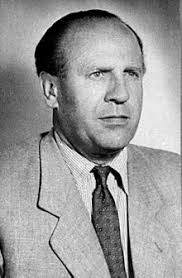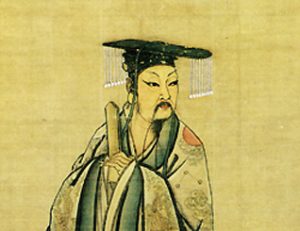Oskar Schindler, a German Industrialist, saw the outbreak of war in 1939 as an opportunity to make money. As the Nazi Army invaded Poland, Schindler took advantage of Poland’s loss by purchasing a near bankrupt factory in Krakow, that he could use to make enameled kitchenware. Taking advantage of a free labor force of Jewish people over the next few years, he amassed a fortune. 1

Having worked as a spy for Adolf Hitler, Schindler made important connections with high ranking Nazi officials. His factory, like many others in German occupied areas, exploited the labor of Jews.2 Not far from his factory in Poland was the concentration camp at Plaszow. That nearby camp was run by Amon Göth, who was known throughout the area for being ruthless and merciless. Jews, and anyone else, that were sent to his camp would almost surely die. The exact number of victims that lost their lives there is not known. However, it is estimated that 80,000 people died in Plaszow in its two-year existence.3 Having these connections with high ranking and prominent men in the Nazi Party, he was able to request to move roughly 900 Jews from this concentration camp to his factory in Krakow less than four miles away. Many of these Jews were unskilled workers, and because of this, they would not have lived long in Göth’s concentration camp. Schindler kept these Jews safe in his factory, and as one of his Jews, Moshe Bejski, a future Israeli Supreme Court Justice from 1979-91, recalled that Schindler would stay with the Jews until midnight when the Nazi soldiers would leave.4
As the Soviet Army progressively advanced its way into Poland, Schindler was forced to move his Jews to his other factory in Brunnlitz, in the Sudetenland. During the transfer, the near three hundred women, being shipped together in the same train car, were mistakenly shipped to Auschwitz. These women were being shipped in one freight train car, with little to no clothes in the middle of winter. The women and girls, many sick, old, or frostbitten, knew where they were, and that if they stayed, they would surely not make it out alive. They were forced to stay the night in the camp, many dreading the next day. Schindler, having found this out in time, personally drove to Auschwitz and bribed the Nazi officials to let him take the women back with him to his factory in the Sudetenland.5

As the Soviets marched west into Czechoslovakia, and as the war in Europe ended, it was clear to Schindler that he would need to inform his people and prepare them for life ahead. On the eighth of May, 1945, he gathered everyone onto the floor of his factory, and they listened to Winston Churchill address the world that Germany had officially surrendered. After this, he spent one last night with the near 1500 people he employed, and saved the lives of, until morning.6 He had to flee, as he could have been tried as a war criminal because he exploited the labor of hundreds, without pay. He would move many times, and in 1974 he would die. As was his request, he was, and still is buried on Mount Zion, Jerusalem. Today the people that thank Schindler for their lives, thousands in number, call themselves Schindlerjuden, or Schindler’s Jews.
- Martin Gilbert, The Righteous: The Unsung Heroes of the Holocaust (New York: Henry Holt, 2004), 224. ↵
- David Crowe, Oskar Schindler: The Untold Account of His Life, Wartime Activities, and the Truth Behind His List (New York: Westview Press, 2004), 45-50. ↵
- Salem Press Encyclopedia, 2015, s.v. “Plaszow Concentration Camp,” by Joseph Dewey. ↵
- “Moshe, Bejski,” Benjamin N. Cardoza School of Law, 2014, http://versa.cardozo.yu.edu/justices/bejski-moshe; Martin Gilbert, The Righteous: The Unsung Heroes of the Holocaust (New York: Henry Holt, 2004), 225. ↵
- David Crowe, Oskar Schindler: The Untold Account of His Life, Wartime Activities, and the Truth Behind His List (New York: Westview Press, 2004), 402. ↵
- Martin Gilbert, The Righteous: The Unsung Heroes of the Holocaust (New York: Henry Holt, 2004), 224. ↵


39 comments
Daniel Matheu Baldor
I enjoyed a lot reading this article. I did not know that Schindler took advantage of a free labor of Jewish people at the beginning. I admire that this man changed his mind and risked his life to save Jewish people from near-death situations. It really shows how people can brave and nice to others in this difficult and horrible situations like the holocaust.
Elliot Avigael
I have been to the Holocaust museum, Yad Vashem, multiple times in Israel and it is incredibly moving and powerful to see Schindler’s name on the Avenue of the Righteous Gentiles. I had the privilege of being able to see the very factory that Oskar Schindler once owned in Poland around two years ago, and just thinking of that very moment brings a tear to my eye. The movie itself is already so powerful, but being at the very site where these events took place takes the emotions to another level.
Oskar Schindler is the biggest example to show us that history isn’t always black and white. Even in times of great turmoil, your greatest enemies might turn out to be your greatest allies.
Aleea Costilla
This was a powerful story about Schindler’s involvement during the holocaust. I had seen the film Schindler’s List years ago, and this article brought to light one of the many stories apart of the greater scope of the holocaust. It was interesting to hear his part of exploiting Jews and how he ultimately came to help those women and children mentioned, escape their near-death fate in Auschwitz.
Genesis Vera
I have surprisingly never seen Schindlers List and I had very little information about Schindler and what he did during World War 2. This was a very well written article and had a good topic. However, I wish I could have gotten a little more information about Schindler. Details on how he went from a Nazi spy to saving Jews or a couple more stories on how he treated the Jews in his factory would have been helpful. Overall, I did find this article to be intriguing.
Rhys Kennedy
It’s more often than not during the most trying of times that we see the true nature of people. Although initially Schindler could be considered a run of the mill Nazi who was profiting off of the forced labor of Jews, after seeing the horrors of the camp at Plaszow thought different of his previous actions and took what could be considered a full one-eighty. It’s stories like these that show that there can be still some amount of good left-over in these situations.
Michael Lazcano
The thing that attracted me to this article was seeing the film Schindler’s List a couple years back. I think that this shows that people who we think are incapable of feeling emotion, or knowing loss actually has a soul. When we think of the word Nazi, we associate them with all the bad, but Schindler performed acts that showed humanity. In times of war and hardship he saved so many lives, and didn’t do it because to was easy, but because it was the right thing to do.
Azucena Cuevas
Oskar Schindler is incredibly brave to risk his own life in order to save 1500 people. It was such a terrible time and it is impossible not to fall under the lust for power. It is sad that he had to move around a lot to avoid being convicted. He was a man to admire and it is honorable what he did for all the Jews he was able to save.
Joshua Garza
This is a very touching article in many ways. Its a very unselfish act for someone with money that is under the control of the Nazis to go behind their back to save nearly 1500 innocent lives. It seems that he did it at the cost of his life as he knew it being a wealthy man of industry because after the war he had to live on the run. He saved those people at a great cost and is a heroic act within itself.
Alicia Guzman
The first time I ever heard about Oskar Schindler was in the eighth grade when my English teacher showed us the movie, Schindler’s List. This well-written article does a good job in describing the details of how Schindler saved so many lives. It is sad how that the only circumstance someone could save people was to claim these horrible ideologies as ones they adhered to.
Maya Mani
I was surprised by the title, wondering how a nazi can be seen as “virtuous”. Even after reading the article I’m. a little confused as to what he did to the jews instead of their execution. However I’m definitely curious Schindler now and want to read more about him. Well done article in the sense that the reader leaves with a conflicting opinion, and I also think the title suits your intentions perfectly.